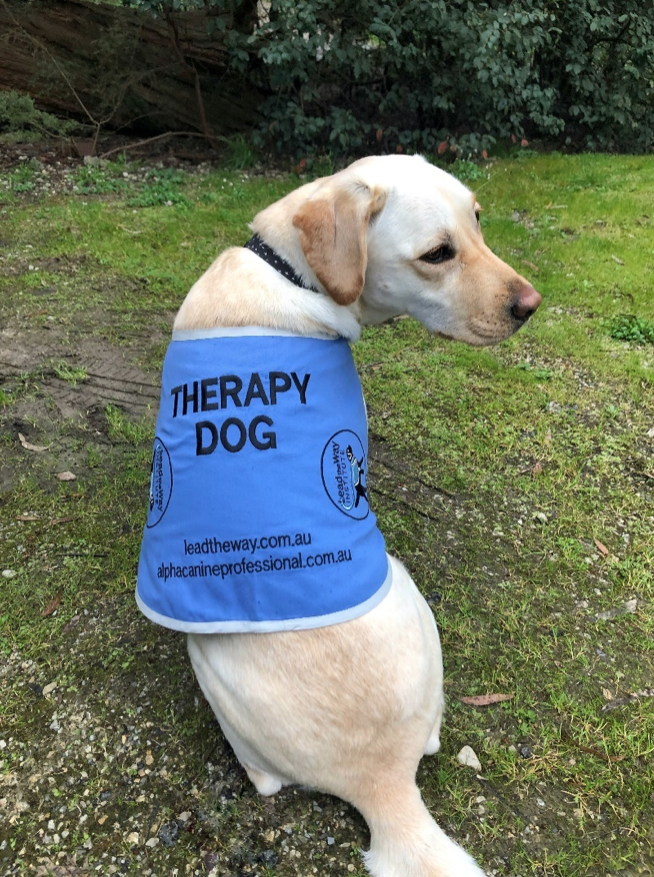How can a therapy dog benefit me in my sessions?
laura on 01/05/2022

“A dog has no use for fancy cars, big homes, or designer clothes. A water logged stick will do just fine. A dog doesn’t care if you’re rich or poor, clever or dull, smart or dumb. Give him your heart and he’ll give you his. How many people can you say that about? How many people can make you feel rare, and pure and special? How many people can make you feel extraordinary?
John Grogan, Marley and Me
Remember how some offices would have “Bring your dog to work day!” and you would feel so excited at the thought of having your best friend join you at work for the day? I’m very fortunate that for me, every day at work is “Bring your dog to work day”. That’s because in my role as a clinical psychologist at Your Mind Matters, I am joined by my best friend, Luna. Luna is my five-year-old yellow Labrador Retriever, who is a certified therapy dog. This means that, not only do I get to enjoy the benefits of owning a dog in my personal life, but I get to see the impact she makes with each and every client.
What is a therapy dog?
Therapy dogs, as well as other animals such as cats, rabbits and horses, are used as part of Animal Assisted Therapy. Animal-assisted therapy, or AAT, involves a situation where an animal is assisting a therapist to reach a specific goal with a client. Many different types of therapies can utilise an animal, such as Psychology, Occupational Therapy and Speech Therapy, to name a few. It is important to note that therapy dogs have a different role to service dogs (Guide dogs, seizure alert dogs etc.), and do not have the same rights or training as service dogs. Despite this, the role of a therapy dog is one of significance, and can make all the difference to therapeutic outcomes.
What are the benefits of having a therapy dog in my sessions?
Dogs are great at engaging individuals, and are usually highly motivated by social contact. This makes them the perfect addition to a session, and in my experience, often when children and adolescents know that they get to “play” with Luna in the session, they are much more motivated to attend. By having Luna in the sessions, a calm space is created and clients know they can let their guard down and feel comfortable, in a non-judgmental space. Luna is a very excitable dog, and makes every single person feel so welcome. She is often able to identify a client’s emotional state, and give them what they need in that moment. For example, if a client is feeling sad and cries, Luna usually recognises this and attempts to comfort the person, by either leaning in close to their face, or will place herself close enough for a pat. It is also helpful having an excitable dog in session, as I use this to teach children about different “Zones of Regulation”. For example, if Luna is in the “yellow zone” (excitable, moving too fast, not focussing), children identify this and help Luna get into the “green zone” (calm, ready to learn), which in turn they learn to apply to themselves. Having a therapy dog in session also assists clients who are not comfortable with making eye contact, as there is something else to focus on in the room.
What are some of the health and psychological benefits of owning a dog?
Studies have shown that individuals who own a dog report less depression, and greater coping skills with things such as grief and loss. Research also shows that playing with a dog increases our dopamine, serotonin and oxytocin levels, which all affect our mood. Dog owners are also more likely to be active, and they force us to socialise, thus increasing our social connectedness. For our little ones, studies have shown growing up with pets may strengthen their immune system resulting in less risk of allergies. It also teaches children a sense of responsibility when they are asked to help care for their pet.
These are just some of the many benefits of pet ownership, but it is important to note that the decision to own a pet is a big one, and each individual or family should weigh up the pros and cons for their individual circumstances.
If you think AAT is suitable for you, or you’d like to know more information, please contact our reception team on 9802 4654.
References
https://leadthewayinstitute.com.au/home/
https://www.helpguide.org/articles/mental-health/mood-boosting-power-of-dogs.htm
https://kb.rspca.org.au/knowledge-base/what-are-the-health-benefits-of-pet-ownership/
This blog was written by Johana Xanthopoulos, Clinical Psychologist at Your Mind Matters.
Johana works with a range of clients, including children and adolescents. Working previously in an early childhood intervention setting, Johana has skills and experience working with a range of childhood disorders, particularly Autism Spectrum Disorder. Johana’s other special interests include anxiety and depression. She has also completed Animal Assisted Therapy training with her dog Luna, who you may see in our office.
Johana is fluent in English and Greek.
- Category: AAT
- Tag: #AAT, #therapydog
